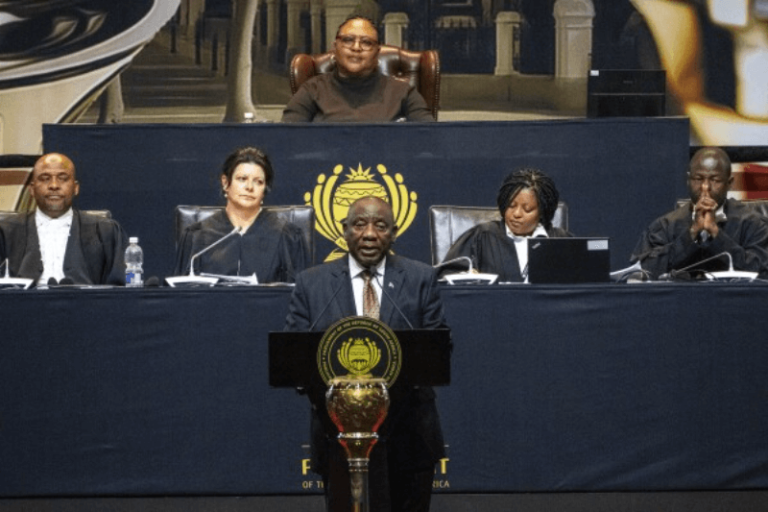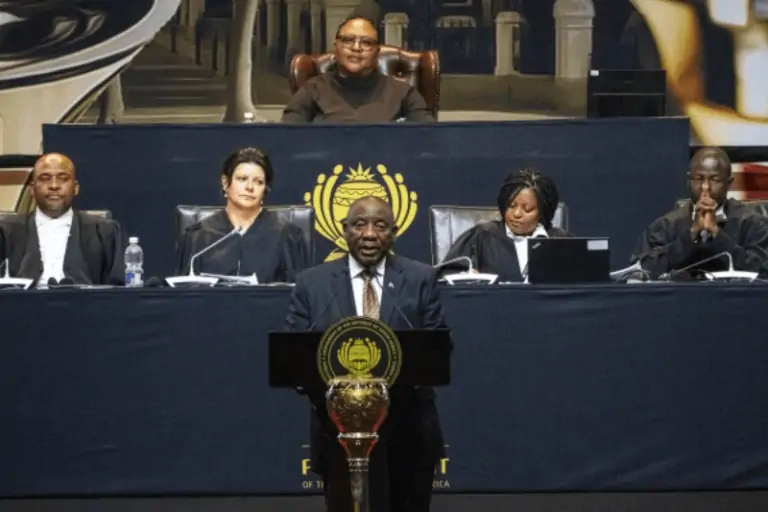

south africa's
Following the historical loss of the African National Congress (ANC) in the most recent national election, South African President Cyril Ramaphosa appointed a new cabinet on Sunday night in a major political change. Following weeks of protracted discussions, the ANC, the former ruling party, along with nine other parties, have created a coalition government for South Africa’s seventh administration.
This declaration follows the 30-year political domination of the ANC that was reversed in the national election. On May 29, the party’s vote share fell to 40%, therefore losing its legislative majority for the first time since apartheid ended in 1994. The ANC was compelled by these unparalleled circumstances to look for coalition partners in order to establish a new government.
Reflecting the coalition’s wide-based character, Ramaphosa’s new multi-party cabinet comprises members from many political groups. With 20 of the 32 Cabinet ministers ANC officials, the ANC kept the biggest proportion of ministerial posts. Previously the largest opposition party, the Democratic Alliance (DA) did, however, land six government positions. Smaller parties split the remaining spots.
Now a major actor in the new coalition government, the DA attracted 21% of the vote. This, involving several parties, symbolizes a fresh phase of political cooperation and communication in South Africa.
Among the prominent appointments, President Ramaphosa reappointed ANC deputy president Paul Mashatile to guarantee consistency in his leadership team. The DA fiercely disagreed with Parks Tau of the ANC’s appointment as minister of trade and industry, a vital position. This choice emphasizes the careful balance Ramaphosa has to perform to preserve the coalition.
John Steenhuisen, the DA leader, was chosen as the minister of agriculture, therefore underscoring the DA’s growing power inside the new administration. To underline even more the inclusive character of the partnership, leaders from four other political parties were appointed as new ministers into the Cabinet.
In his speech, President Ramaphosa underlined in overcoming political obstacles the need of communication and cooperation. “We have shown that there are no problems that are too difficult or too intractable that they cannot be solved through dialogue,” he said, noting the difficulty of the negotiations that produced the coalition.
The President further underlined the importance of significant involvement among all coalition members in the national executive. Ramaphosa said, stressing his dedication to a cooperative government model, “We have had to ensure that all the parties are able to participate meaningfully in the national executive.”
A coalition government represents a major break from ANC’s long-standing unilateral control. It exposes the political terrain to more inclusiveness and shared government. This change may result in more equitable policy decisions and more varied range of interests and point of view reflection in policies.
The capacity of the coalition members to cooperate efficiently despite their disagreements will determine its success. Whether this new political system can bring about stability and favorable change in South Africa will depend much on the next months.
The political scene of South Africa shows a momentous and hitherto unheard-of change with the new coalition administration. With members from several political parties, President Cyril Ramaphosa’s Cabinet reorganization emphasizes the need of communication and teamwork in tackling problems facing the country. All eyes will be on the new government’s capacity to live up to its promises and negotiate the complexity of coalition politics as it starts its work.
The Oklahoma City Thunder secured their tenth consecutive victory by beating the Chicago Bulls 145-117. This victory raised their season…
Rob Walter Resigns his Position as coach for the Proteas men's team for white-ball games because personal problems needed attention.…
Starting April 2, South African drivers will get lower costs when filling their tanks as fuel prices decrease for all…
The U.S.-based driver training company Zutobi analyzed road safety worldwide and found South Africa stays last in driving danger since…
The Basketball Africa League (BAL) returns for its 2025 season with exciting changes and developments. Since 2019 the NBA-linked basketball…
The Somali president supports their military forces to eliminate the threats from Al-Shabaab, ISIS, and Al-Qaeda. The Somali National Army…
This website uses cookies.